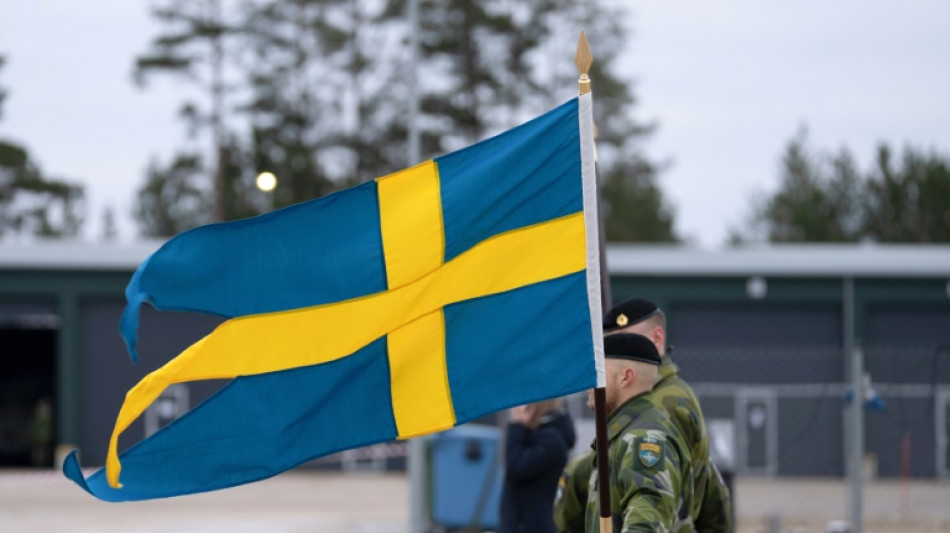
-
 Israel cancels visas for French lawmakers
Israel cancels visas for French lawmakers
-
Russia and Ukraine trade blame over Easter truce, as Trump predicts 'deal'

-
 Valverde stunner saves Real Madrid title hopes against Bilbao
Valverde stunner saves Real Madrid title hopes against Bilbao
-
Ligue 1 derby interrupted after assistant referee hit by projectile

-
 Leclerc bags Ferrari first podium of the year
Leclerc bags Ferrari first podium of the year
-
Afro-Brazilian carnival celebrates cultural kinship in Lagos

-
 Ligue 1 derby halted after assistant referee hit by projectile
Ligue 1 derby halted after assistant referee hit by projectile
-
Thunder rumble with record win over Memphis in playoff opener

-
 Leverkusen held at Pauli to put Bayern on cusp of title
Leverkusen held at Pauli to put Bayern on cusp of title
-
Israel says Gaza medics' killing a 'mistake,' to dismiss commander

-
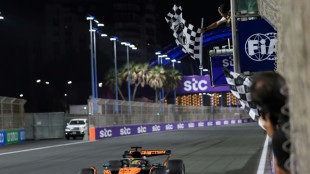 Piastri power rules in Saudi as Max pays the penalty
Piastri power rules in Saudi as Max pays the penalty
-
Leaders Inter level with Napoli after falling to late Orsolini stunner at Bologna

-
 David rediscovers teeth as Chevalier loses some in nervy Lille win
David rediscovers teeth as Chevalier loses some in nervy Lille win
-
Piastri wins Saudi Arabian Grand Prix, Verstappen second
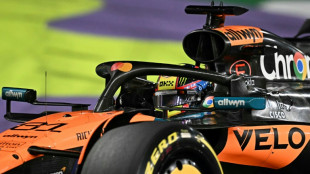
-
 Kohli, Rohit star as Bengaluru and Mumbai win in IPL
Kohli, Rohit star as Bengaluru and Mumbai win in IPL
-
Guirassy helps Dortmund past Gladbach, putting top-four in sight

-
 Alexander-Arnold lauds 'special' Liverpool moments
Alexander-Arnold lauds 'special' Liverpool moments
-
Pina strikes twice as Barca rout Chelsea in Champions League semi

-
 Rohit, Suryakumar on song as Mumbai hammer Chennai in IPL
Rohit, Suryakumar on song as Mumbai hammer Chennai in IPL
-
Dortmund beat Gladbach to keep top-four hopes alive

-
 Leicester relegated from the Premier League as Liverpool close in on title
Leicester relegated from the Premier League as Liverpool close in on title
-
Alexander-Arnold fires Liverpool to brink of title, Leicester relegated

-
 Maresca leaves celebrations to players after Chelsea sink Fulham
Maresca leaves celebrations to players after Chelsea sink Fulham
-
Trump eyes gutting US diplomacy in Africa, cutting soft power: draft plan

-
 Turkey bans elective C-sections at private medical centres
Turkey bans elective C-sections at private medical centres
-
Lebanon army says 3 troops killed in munitions blast in south

-
 N.America moviegoers embrace 'Sinners' on Easter weekend
N.America moviegoers embrace 'Sinners' on Easter weekend
-
Man Utd 'lack a lot' admits Amorim after Wolves loss

-
 Arteta hopes Arsenal star Saka will be fit to face PSG
Arteta hopes Arsenal star Saka will be fit to face PSG
-
Ukrainian troops celebrate Easter as blasts punctuate Putin's truce

-
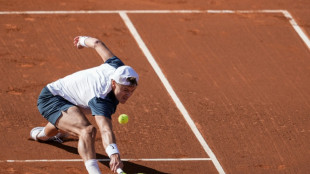 Rune defeats Alcaraz to win Barcelona Open
Rune defeats Alcaraz to win Barcelona Open
-
Outsider Skjelmose in Amstel Gold heist ahead of Pogacar and Evenepoel
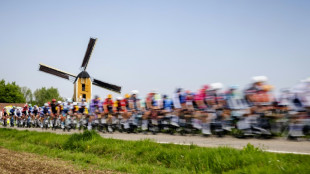
-
 Arsenal make Liverpool wait for title party, Chelsea beat Fulham
Arsenal make Liverpool wait for title party, Chelsea beat Fulham
-
Trump slams 'weak' judges as deportation row intensifies
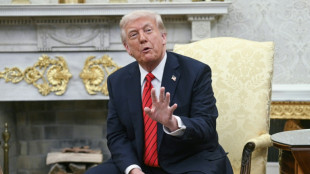
-
 Arsenal stroll makes Liverpool wait for title as Ipswich face relegation
Arsenal stroll makes Liverpool wait for title as Ipswich face relegation
-
Sabalenka to face Ostapenko in Stuttgart final
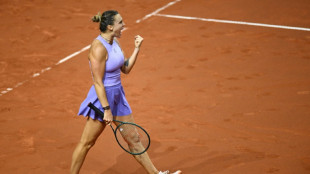
-
 Kohli, Padikkal guide Bengaluru to revenge win over Punjab
Kohli, Padikkal guide Bengaluru to revenge win over Punjab
-
US aid cuts strain response to health crises worldwide: WHO

-
 Birthday boy Zverev roars back to form with Munich win
Birthday boy Zverev roars back to form with Munich win
-
Ostapenko eases past Alexandrova into Stuttgart final

-
 Zimbabwe on top in first Test after Bangladesh out for 191
Zimbabwe on top in first Test after Bangladesh out for 191
-
De Bruyne 'surprised' over Man City exit

-
 Frail Pope Francis takes to popemobile to greet Easter crowd
Frail Pope Francis takes to popemobile to greet Easter crowd
-
Lewandowski injury confirmed in blow to Barca quadruple bid

-
 Russia and Ukraine accuse each other of breaching Easter truce
Russia and Ukraine accuse each other of breaching Easter truce
-
Zimbabwe bowl Bangladesh out for 191 in first Test in Sylhet

-
 Ukrainians voice scepticism on Easter truce
Ukrainians voice scepticism on Easter truce
-
Pope wishes 'Happy Easter' to faithful in appearance at St Peter's Square

-
 Sri Lanka police probe photo of Buddha tooth relic
Sri Lanka police probe photo of Buddha tooth relic
-
Home hero Wu wows Shanghai crowds by charging to China Open win


Sweden to boost defence spending $30 bn over a decade
Sweden will increase defence spending by about 300 billion kronor ($30 billion) over the next decade, the prime minister said Wednesday, calling it the nation's biggest rearmament push since the Cold War.
The Nordic country drastically slashed defence spending after the Cold War ended and in the early 2000s, but reversed course following Moscow's 2014 annexation of Crimea.
The aim was to increase defence spending to 3.5 percent of GDP by 2030, up from the current 2.4 percent.
"We have a completely new security situation... and uncertainties will remain for a long time," Prime Minister Ulf Kristersson told reporters, adding that it marks Sweden's "biggest rearmament since the Cold War".
The Nordic country dropped two centuries of military non-alignment and applied for membership in NATO in the wake of Russia's invasion of Ukraine, becoming its 32nd member in March 2024.
Sweden has already decided on investments that are expected to put defence spending at 2.6 percent of GDP in a few years, Kristersson said, noting this already put it above NATO's two-percent spending target.
"That is not enough," Kristersson said. "Our assessment is that NATO and especially European NATO countries need to take major steps in the coming years."
Kristersson said that his country expected that NATO would decide to increase the spending target at an upcoming summit of the alliance in June and was aiming at what it was believed that new target would be.
In March 2022, after Russia's full-fledged invasion of Ukraine, Stockholm announced it would increase spending, aiming to dedicate two percent of GDP to defence "as soon as possible".
While previous defence spending increases have been financed through the country's regular budget, Kristersson said that in order to rearm in such short time it was necessary to borrow funds for defence during a "transitional period".
"Today's announcement can really be summed up as a larger, faster and stronger total defence, both civilian and military," Deputy Prime Minister and Energy Minister Ebba Busch said, speaking alongside Kristersson.
- Long process -
US President Donald Trump has turbocharged a drive for Europe to rearm by casting doubt on Washington's central role in NATO and his overtures towards Russia on Ukraine.
Earlier this month, European Commission chief Ursula von der Leyen unveiled an initiative to help ramp up military budgets that she says could mobilise up to 800 billion euros.
Jacob Westberg, an associate professor at the Swedish Defence University, told AFP that, while 3.5-percent-of-GDP target was a sharp increase compared to the low spending levels seen in the early 2000s, it was still comparable to what was spent in the 1970s.
Westberg noted that Sweden spent over four percent of GDP in the 1950s and in fact at the time had the world's fourth largest air force and eighth largest navy.
"We could mobilise between 600,000 and 800,000 men during the Cold War," Westberg said.
He also added that while 300 billion kroner over a decade was a considerable addition, Sweden's defence budget had already been tripled, to 120 billion a year, in 2024, compared to a decade earlier.
In addition, while funding was returning to previous levels, rebuilding a country's military takes time, Westberg said.
"In some areas, such as buying ammunition or equipment... you can relatively easily convert funds into military capacity," the associate professor said.
But when it comes to the issue of expanding the size of the military, which has been Sweden's ambition since it reintroduced conscription in 2017 after a seven year pause, that is more time-consuming.
"As such, you can't expect these funds to have an immediate effect comparable to the amount of additional funds," Westberg said.
G.Stevens--AMWN